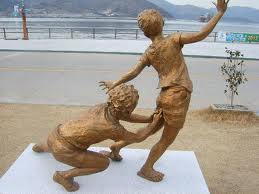I had been in Korea for less than a week when I was introduced to my manager’s middle and index fingers half inserted up my rectum. Eighteen months later I feel I am ready to write about that most unwelcome violation. It is called dong-chim. Roughly translated, it means ‘poop needle’. A Korean act that I am told originated in Japan.
Surprisingly, it has been deemed culturally acceptable for people of all ages to insert their fingers up the unfortunate’s anus. When the Japanese introduce their digits to the rectum ‘Kan-CHO!’ is shouted, expressing their delight at this unseemly and unwanted penetration.
Suffice to say there was a shout during the exchange but it did not come from the perpetrator.
What I had so gracelessly experienced is an example of ‘K-Sexual‘, something which westerners may consider as a homosexual action but which, nevertheless, has been woven into the culture of the generally homophobic society of Korea.
It took me some time to realise that boys from an early age in Korea show signs of a special bond between their same-sex peers. Of course, as a boy growing up in England, befriending a girl was potentially seen as social suicide. Too much time spent with girls or even the wrong ones could be an excuse to alienate your friends. If however you managed the delicate balancing act of platonic relationships between the sexes, then it could be an opportunity to be quietly envied and even admired by your peers. Naturally, as a child nothing is ever that black and white. In Korea, it is no different. Boys are still just as unsure about the opposite sex, always reverting to where they feel comfortable and at ease – with their male friends.
Teaching English in Korea is my sole experience at being in a position where it is almost a prerequisite to observe the behaviour of young pupils. So any comparisons I make are from my own experiences as a child, people with whom I grew up and internet forums.
 Coming from an English background it looks to me as if children here still have their innocence and have not been darkened by words like paedophile, sex-pest or been affected by the memory of the Child Catcher (Chitty Chitty Bang Bang). Korea is a very trusting society; young children are left to play alone, doors left open. So it is to be expected that what westerners may deem as naivety continues into the classroom.
Coming from an English background it looks to me as if children here still have their innocence and have not been darkened by words like paedophile, sex-pest or been affected by the memory of the Child Catcher (Chitty Chitty Bang Bang). Korea is a very trusting society; young children are left to play alone, doors left open. So it is to be expected that what westerners may deem as naivety continues into the classroom.
As a teacher I have witnessed some of the overtly friendly acts of young boys. In the classroom I’ve observed them sitting on one another’s lap whilst enjoying one another’s company. For instance, being deep in close conversation, or playing a game of Kawi-Bawi-Bo, (rock, scissor, paper). However, as they begin to reach puberty a spatial gap comes about gradually. Now, instead of the earlier closeness (of one sitting fondly on the knee of a friend), arms are draped over one another as they converse. Then moving into adulthood (certainly the elder generation) spatial boundaries increase to arm’s length, and later to the stage where drunken males are walking down the street hand in hand.
The current generation of Korean men can often be described as super metro-sexual – taking an immense amount of time to look ‘respectable’. To the outsider it would appear that for this Korean generation that there are no strong role models to which the young male may aspire. Korea’s pop culture (K-Pop) is showcased by men with feminine baby-like features in both attitude and appearance.
For today’s Korean woman prettiness in a man is attractive.
At the same time as this is happening, women are becoming more independent and career-driven. In a sense, the softer and more demure position they occupied is being filled by men. It’s almost like witnessing the grooming of future generations for an asexual society. But then the more thoughtful foreigner must bring to mind the apparent effeminacy and foppishness in the history of European societies. Somehow, this grooming with all its affectations did nothing to weaken warring tendencies.
Whilst a westerner may initially be surprised by some aspects of same-sex relationship in Korean society, he or she would be well advised to place these comments in the wider context of history.
But in spite of all my ponderings on the sexual mores, possible direction of the sexes and the development of the male libido in Korea, my manager never dared to go near my rear end again.
© John Brownlie 2010


Recent comments